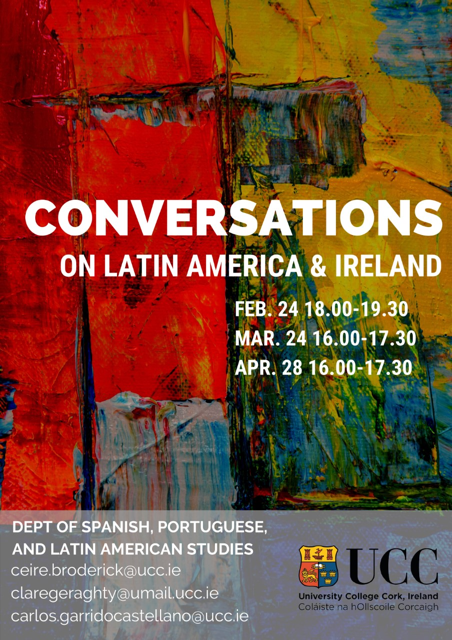Conversations on Ireland and Latin America

February 24th – March 24th – April 28th 2021
A series of conversations on the growing connections between Ireland and Latin America in the areas of academia, art and activism. Throughout February, March and April, we will host a monthly virtual session, which will bring together academics, activists and artists with a connection to or a research interest in Latin America for a round table discussion, followed by participation from the audience. A key aim of these sessions is to connect those of us on the island of Ireland with an interest in social and cultural issues that impact Latin America, which are also relevant in our own communities.
Speakers included:
Pascale Baker is a Lecturer in Latin American Studies at UCD whose research focuses on banditry and its representations in Latin American literature, on which she has written a monograph focusing on the 19th and early 20th centuries. She is currently working on several projects, including a study of the contemporary female narco leader and her representation in literature, film and popular culture, as well as a collaborative, interdisciplinary project on ‘urgent witnessing in lockdown’, which starts to analyse the ways women in Mexico and other parts of Latin America have dealt with the surge in gender-based violence pre and post-Covid.
Gabriela Burnett is a Bolivian migrant woman (and Sulien's mam) living in Ireland since 2017. I came here as an English Language Student originally. In terms of my academic background, I have a degree in Economics (Specialization in Environmental Economics), a Masters Degree in Natural Resources Management, and a Bachelor of Business (Hons) Level 8 in Ireland. While here in Ireland I have been working different jobs, but, like most migrants, none of them related to my background. I have been involved as a volunteer in the Association of Bolivian Residents in Ireland, MRCI and LASC, in capacity building projects in areas like workers rights, women's rights and tenants rights.
Sian Cowman has worked in the area of climate change and environmental justice as an educator and campaigner, in Ireland and in Latin America, for the past 10 years. She is active in social and environmental justice campaigns in Ireland, including in Stop Blood Coal Ireland, a group that works in solidarity with communities affected by the Cerrejón coal mine in La Guajira, Colombia. You can find her on Twitter @Sian_Cowman.
Lorna Dillon is a Leverhulme Early Career Fellow at Ulster University. Her research focus is Latin American textile art. Her current project explores the link between visual art and human rights through the critical lens of transnational art movements and diasporas. The project is entitled 'The Symbolic in Processes of Transitional Justice: Textile Art in Latin America'. Lorna is looking at embroideries, quilts and arpilleras (appliqués) created by artists and art collectives in Colombia, Mexico and Chile. Lorna's doctoral research was on the embroideries, papier-mâché sculptures and oil paintings created by the Chilean artist Violeta Parra and this led to two books, the edited volume Violeta Parra: Life and Work (Tamesis, 2017) and the monograph Violeta Parra's Visual Art: Painted Songs (Palgrave, 2020). Lorna's work confronts the legacies of colonialism as well as exclusionary biases in the art world, particularly with regard to craft work, participatory textile art movements and the art of the Global South.
Isabela Hoban is a Peruvian born artist, musician and sound therapist living in Ireland. Her visual art, mixed-media installation and sculpture, explores internal states, life cycles and the pursuit of meaning. In particular meaning with multiple readings. Isabela exhibits as a solo artist and has also been part of an international artists collective. Isabela is interested in the connection between the arts and medicine and has been involved in projects related to that topic. Her recent exhibitions have addressed the complexity of space and time through projects involving archaeological sites and references to the intermixing of specific cultural aesthetics with transient inner experience using a powerful and direct visual approach.
Tori Holmes is Senior Lecturer in Brazilian Studies at Queen’s University Belfast. Her main research interests are in socially and politically engaged uses of the internet and digital technologies in Brazil, and contemporary Brazilian documentary and audiovisual production. Her publications include articles in Journal of Latin American Cultural Studies, Journal of Urban Cultural Studies, and Journal of Iberian and Latin American Studies, and she is currently preparing a book manuscript tying together the different strands of her work on Brazilian digital culture. She is one of the founders of REBRAC, the European Network of Brazilianists Working in Cultural Analysis, and as part of her interest in engaging a wider audience with the themes of her research has been involved in developing the Belfast Brazilian CineClub project and Other Registers, a collaborative sound installation about police violence in Brazil.
Brenda Mondragón Toledo is a Mexican PhD student at the Sociology Department and SPLAS. Her current research is a comparative study of gender violence in Ireland and Mexico through textiles, using Participatory Arts Research. Her research interests lie in the sociological and anthropological study of textiles and embroidery among different spaces from a feminist perspective. Specifically, her research lies in analysing the social impact of textiles in everyday life, consumption, fashion, political resistance, collective memory and as a methodological tool to speak about gender violence. This impact has been studied through the making process, the transmission of knowledge, among support networks, and the legal protection of indigenous textiles.
Department of Spanish, Portuguese and Latin American Studies
Contact us
First Floor - Block B East O'Rahilly Building University College Cork Ireland
